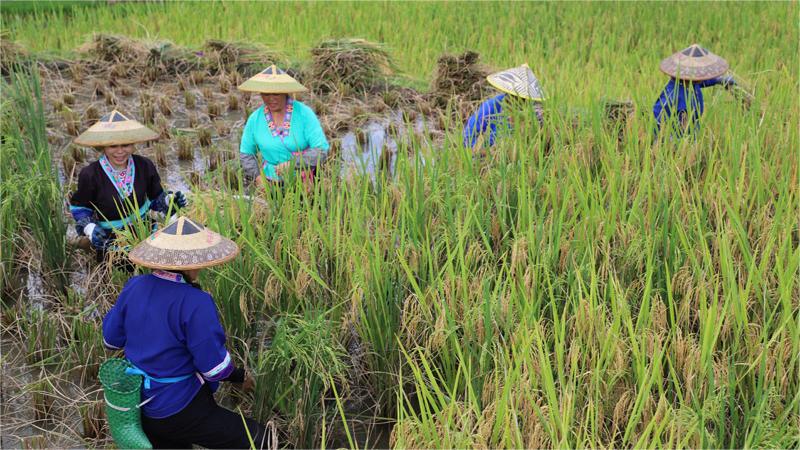Xiplomacy: Xi encourages African scholars to bolster China-Africa cooperation, Global South development
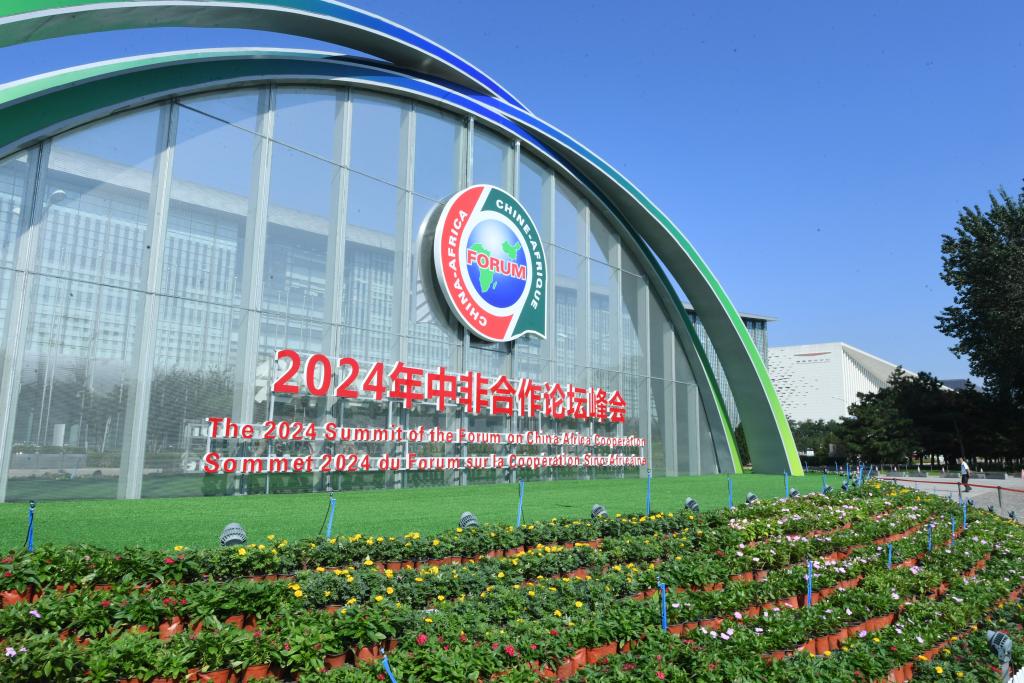
This photo taken on Aug. 29, 2024 shows the logo of the 2024 Summit of the Forum on China-Africa Cooperation (FOCAC) near China National Convention Center in Beijing, capital of China. (Xinhua/Ren Chao)
The increase in scholarships and educational opportunities for African students in China has enabled thousands of young Africans to gain advanced skills and knowledge in fields like engineering, medicine, and environmental science, said Rodrigue Tene Taling, executive director of the Center for African Films and TV under the Institute of African Studies at Zhejiang Normal University.
NAIROBI, Sept. 2 (Xinhua) -- Chinese President Xi Jinping encouraged African scholars to continue to provide intellectual support for building a high-level China-Africa community with a shared future and safeguarding the common interests of the Global South.
Xi made the remarks in reply to a joint letter from 63 scholars from 50 African countries, who extended their warm congratulations on the successful conclusion of the third plenary session of the 20th Central Committee of the Communist Party of China (CPC).
Noting that the upcoming Forum on China-Africa Cooperation (FOCAC) summit comes at an opportune time, the scholars applauded China's strong commitment to China-Africa academic exchanges and voiced confidence that they believe the building of a high-level China-Africa community with a shared future will bring tangible and lasting benefits to Africa, China, and the world at large.
FROM ACADEMIC ACHIEVEMENTS TO COOPERATION CONSENSUS
Xi voiced hope that based on the Dar es Salaam Consensus between China and Africa, both sides will step up research and exploration on the development path of Global South countries, China-Africa and South-South cooperation, and continue to provide important intellectual support for building a high-level China-Africa community with a shared future and safeguarding the common interests of the Global South.
"It is very humbling to receive feedback that indeed our letter has been signed by President Xi Jinping. The rise in African voices is of great importance to safeguarding the benefits of Global South countries, and I attribute the recent rise in African voices when it comes to scholarly exchanges on Sino-African relations to initiatives by the Chinese government led by President Xi," said Paul Frimpong, executive director of the Africa-China Center for Policy and Advisory, a think tank based in Ghana.
"China-Africa academic exchanges have yielded fruitful results, many African scholars like me could access various platforms to do field research and exchange academic ideas with other African and Chinese counterparts, enabling the two sides to deepen our mutual understanding and foster better policies to boost the bilateral cooperation," Frimpong said.
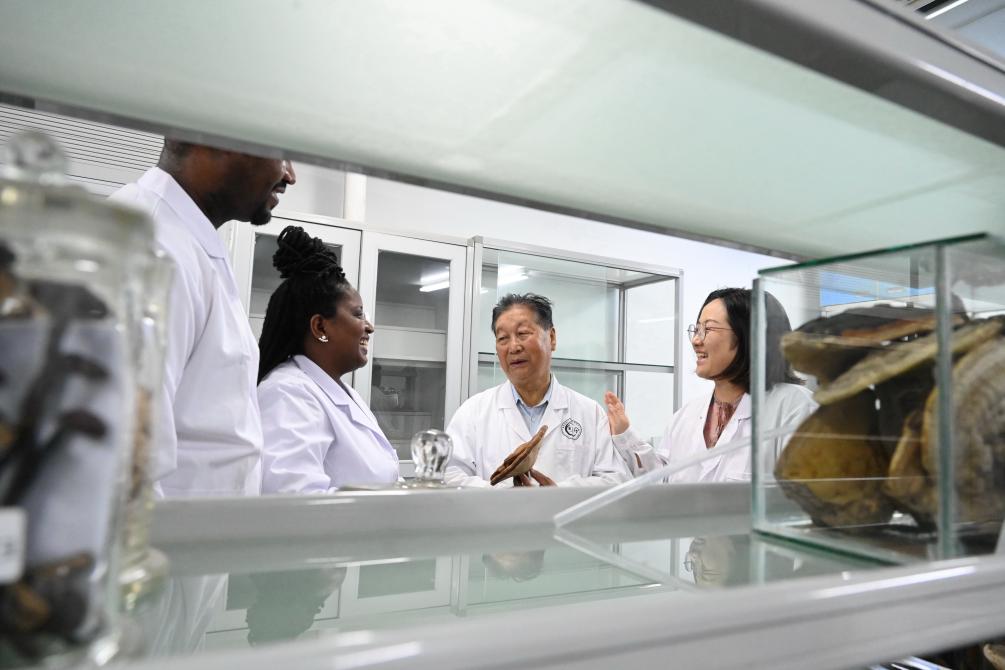
Lin Zhanxi (2nd R) and his daughter Lin Dongmei (1st R) introduce Juncao technology to Rwandan students at Fujian Agriculture and Forestry University in Fuzhou, southeast China's Fujian Province, Aug. 26, 2024. (Xinhua/Lin Shanchuan)
Academic exchanges have not only deepened mutual understanding but have also significantly contributed to the development of various sectors in Africa, said Rodrigue Tene Taling, executive director of the Center for African Films and TV under the Institute of African Studies at Zhejiang Normal University.
The increase in scholarships and educational opportunities for African students in China has enabled thousands of young Africans to gain advanced skills and knowledge in fields like engineering, medicine, and environmental science, said Taling.
"This has not only empowered these individuals but has also created a new generation of African professionals who are equipped to drive progress in their home countries. Moreover, these academic exchanges have facilitated cultural understanding and fostered long-term relationships between African and Chinese scholars, which are essential for sustainable cooperation," Taling said.
"These scholars from think tanks and universities have provided a 'marketplace of ideas' and infused the policy process with new groundbreaking ideas that continue to spur the growth and development of China and Africa cooperation. Through providing platforms for policy research, study, and debates, the scholars have produced cutting-edge policies that are shaping various global discourses that advance the common interest of the Global South," said Dennis Munene, executive director of the China-Africa Center at the Africa Policy Institute in Nairobi, Kenya.
During the 13th Meeting of the China-Africa Think Tanks Forum held in Tanzania's port city of Dar es Salaam in March this year, scholars from 50 African countries jointly issued the Dar es Salaam Consensus, which proposed solutions to major global issues and challenges, drawing widespread attention and positive responses from the international community. It also signifies that African nations are increasingly exploring a modernization path tailored to their unique circumstances with greater self-awareness and independence.
Humphrey Moshi, director of the Center for Chinese Studies at the University of Dar es Salaam, was among the African scholars who wrote the letter to the Chinese president. He attended the 13th meeting of the China-Africa Think Tanks Forum this year.
"In terms of South-South cooperation, the Africa-China Dar es Salaam Consensus is significant as it reinforces the unity of the Global South in advocating for a more just and equitable international order, said Moshi. "By strengthening collaboration among developing nations, it helps protect their common interests, ensuring that their voices are heard in global decision-making processes. This consensus, therefore, is a vital step towards achieving a more balanced and inclusive global community."
"As the biggest exporter of peace and development, Beijing has extended development partnership and assistance to poor countries under the banner of common prosperity. Africa and China stand to benefit from sustained development engagement," Cavince Adhere said.
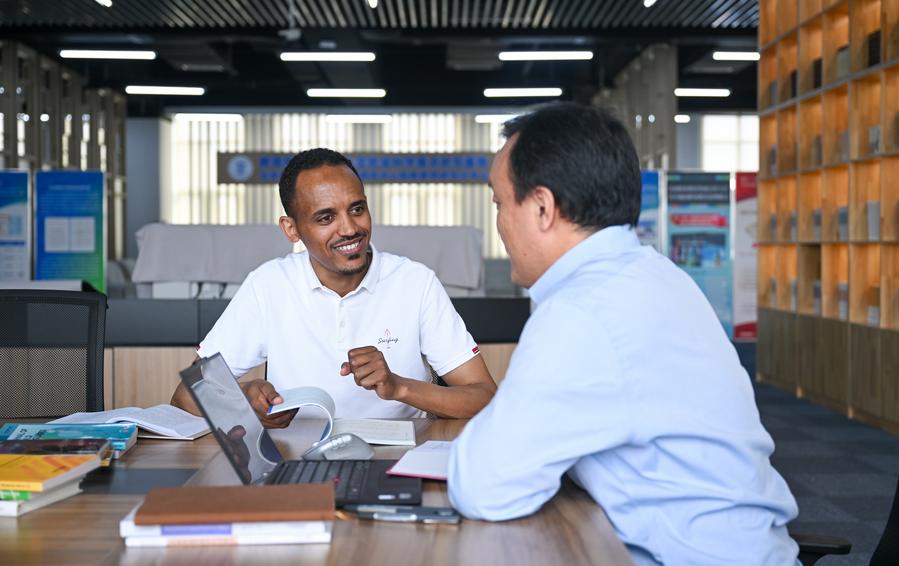
Tola Tsegaye Alemu (L), a 34-year-old Ethiopian, discusses with doctoral supervisor Mi Jing in Tianjin University of Technology and Education in north China's Tianjin, June 27, 2024. (Xinhua/Sun Fanyue)
NEW OPPORTUNITIES FOR GLOBAL SOUTH
In his reply, Xi noted that not long ago, the third plenary session of the 20th CPC Central Committee was successfully held, sounding a clarion call of the times to open up broad prospects for Chinese modernization through further deepening reform.
The continuous development and growth of China, which pursues peaceful development and is committed to reform and opening up, will surely further strengthen the forces for world peace and international justice, and inject inexhaustible impetus into the process of global modernization, especially the development and revitalization of the Global South, Xi said.
In their letter to Xi, African scholars highlighted the profound changes and progress China has made over the past 70 years. These achievements, rooted in a people-centered philosophy, hard work, innovation, and policies of reform and opening up, have taken place under the strong leadership of the CPC. As a result, China has followed a socialist path with Chinese characteristics, achieving remarkable successes widely regarded as a development miracle.
They also noted that China's reform and opening up not only fueled its development but also significantly contributed to global peace, progress, and the establishment of a more just and equitable world order. China's path to modernization not only creates economic miracles and development opportunities but also explores a new form of civilization.
China's exploration of a new form of civilization, which integrates modernity with traditional values, also offers a model for sustainable development that respects cultural diversity, Taling said.
"This approach challenges the notion that Western modernity is the only viable path to progress, and instead promotes a multipolar world where different civilizations can coexist and thrive on their own terms," he said.
"In essence, China's development contributes to a more just and equitable world order by promoting a multipolar world where power is more evenly distributed, and where all nations, regardless of size or economic power, have the right to pursue their development goals in a way that aligns with their values and aspirations," Taling added.
"China's approach to development, particularly under the framework of Chinese modernization, emphasizes peaceful development, international cooperation, and mutual benefit. This approach strengthens global peace and justice by promoting a model that avoids conflict and fosters diplomatic solutions. In the context of the Global South, China's commitment to peaceful development creates opportunities for other developing nations, including African countries, to engage in mutually beneficial partnerships that enhance economic growth without compromising sovereignty," Moshi said.
"China and Africa are indeed ideal partners in pursuing their respective modernization goals. Both sides share a commitment to development that is inclusive, sustainable, and peaceful. China's experience in lifting hundreds of millions out of poverty provides valuable insights for African countries that are similarly striving to achieve economic transformation," he said.
"China's new development model offers significant opportunities to Africa and other developing countries, particularly in terms of infrastructure development, technology transfer, and capacity building. These aspects are crucial for overcoming global challenges such as economic recovery and uneven development. The China-proposed Belt and Road Initiative (BRI) is a prime example of how this model can be operationalized, providing African countries with the infrastructure needed to boost trade, improve connectivity, and foster sustainable development," Moshi added.
"China-Africa relations have emerged as a yardstick for global south cooperation. The two sides should champion new forms of global governance architecture that protect the interests of emerging economies while unleashing the full economic, sociocultural and political potential of both sides," said Adhere, an international relations specialist from Kenya, noting that the forum set for this week in Beijing provides a good platform for the two sides to reimagine what is possible and zealously pursue common agendas for development.
"The China-Africa Cooperation has strengthened high-quality sustainable development commitments, ensuring that no country or society is left behind. This exemplifies the true meaning of building a community with a shared future for all mankind," Munene said.
"China-Africa cooperation has stood the test of time even in the face of changing global dynamics and keeps advancing. China-Africa friendship has endured various historical shifts and challenges," said Balew Demissie Kebede, a researcher at the Ethiopian Policy Studies Institute.
The China-Africa relationship over the past decade has been a dynamic one, marked by China's significant investment in infrastructure, particularly in transportation and renewable energy sectors in Africa, boosting economic growth, creating jobs, improving connectivity, and facilitating trade, said Kebede.
China-Africa's ties have been characterized by a friendly bilateral, multilateral and holistic relationship, covering a range of cooperation in economic development, trade, culture, education, health, politics, governance, security, diplomacy and people-to-people interactions, Kebede said.
Bilateral trade has grown exponentially, making China Africa's largest trading partner for years, opening new markets and opportunities for emerging nations in Africa, Kebede added.
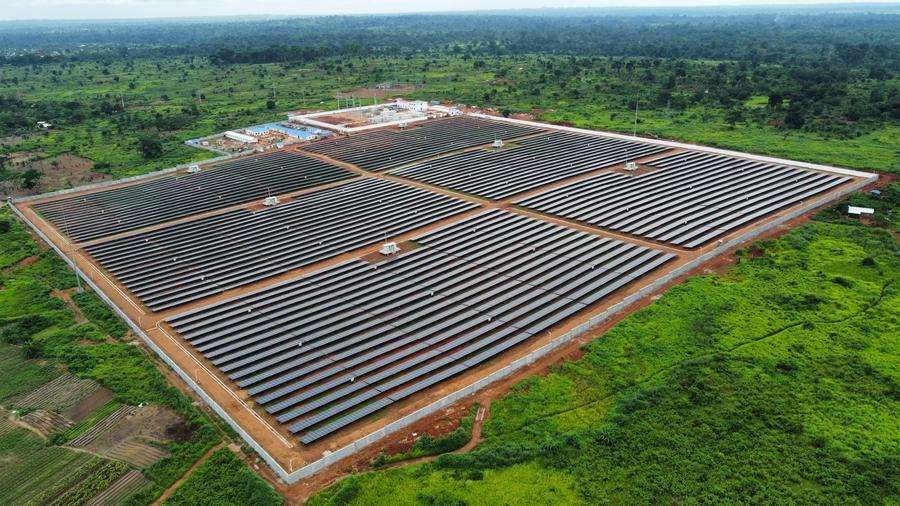
This aerial photo taken on June 2, 2022 shows Sakai photovoltaic power plant in Bimbo, near Bangui, in the Central African Republic. (Tianjin Electric Power Construction/Handout via Xinhua)
DISCUSSION ON FUTURE DEVELOPMENT PLANS
China and Africa have always been a community with a shared future, Xi wrote in reply.
Xi noted that in the face of a volatile and intertwined world situation, China and Africa need to strengthen solidarity and cooperation more than ever before.
The upcoming summit will bring together Chinese and African leaders once again to discuss China-Africa cooperation, which will open up even more splendid prospects for China-Africa relations, he said.
The launch and implementation of the FOCAC have led to the construction of a wide range of major infrastructure projects for the benefit of the African continent, and the strengthening of diplomatic, economic, commercial, cultural, and health ties between China and Africa, said Amadou Diop, a Senegalese expert on China.
"Many African countries have been able to benefit from a wide range of high-quality infrastructure projects as part of their cooperation. China has made a huge contribution to Africa's economic and social development, building thousands of km of roads, railways, airports, bridges, hydroelectric dams, industrial parks, stadiums, universities, schools and hospitals across the continent," Diop said.
"It is now Africa's leading trading partner and has been for over a decade. To date, their trade amounts to 282.1 billion U.S. dollars. And more than 3,000 Chinese companies are now present in Africa, where they have invested more than a hundred billion dollars. And the list goes on. And China remains the African Union's leading partner in the implementation of Agenda 2063," he said.
On the theme of "Joining Hands to Advance Modernization and Build a High-Level China-Africa Community with a Shared Future," the 2024 Summit of the FOCAC will be held from Sept. 4 to 6. Chinese and African leaders will gather in Beijing again after six years to discuss future development and cooperation and exchange governance experience.
"The upcoming FOCAC presents a valuable opportunity to build on the successes of China-Africa cooperation and to chart a path forward that addresses the shared challenges of today's world. By strengthening unity and deepening collaboration, China and Africa can continue to advance their common goals and contribute to a more peaceful, prosperous, and equitable global future," Taling said.
"In the context of the upcoming FOCAC, both civilizations will provide tailor-made policies that deliver cutting-edge solutions for the traditional and non-traditional security threats facing countries in the global south," Munene said.
For Africa, the China-Africa Cooperation has facilitated the adoption and implementation of other global shared values such as the China-proposed BRI, the Global Development Initiative, the Global Security Initiative, the Outlook on Peace and Development in the Horn of Africa, and the Global Civilization Initiative, that have revolutionized and complimented the Agenda 2063, Africa's development blueprint to achieve inclusive and sustainable socio-economic development over a 50-year period, Munene said.
"As you look at our relationship with China, it is always based on values, sincerity, common good, respecting each other, win-win cooperation. China is a friend that respects your views, even when we look at FOCAC, China always asks Africa what you want, and how should we address this, they do not impose," said Allawi Ssemanda, executive director of Development Watch Center, a think-tank based in Uganda.
"The relationship is brotherly, comradeship. It is based on equality, respecting each other's independence and characteristics, not imposing things that might not work for you," he said.
Photos
Related Stories
Copyright © 2024 People's Daily Online. All Rights Reserved.









